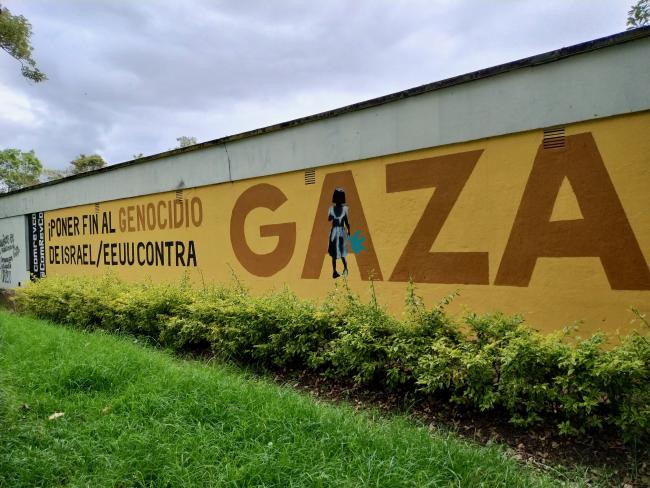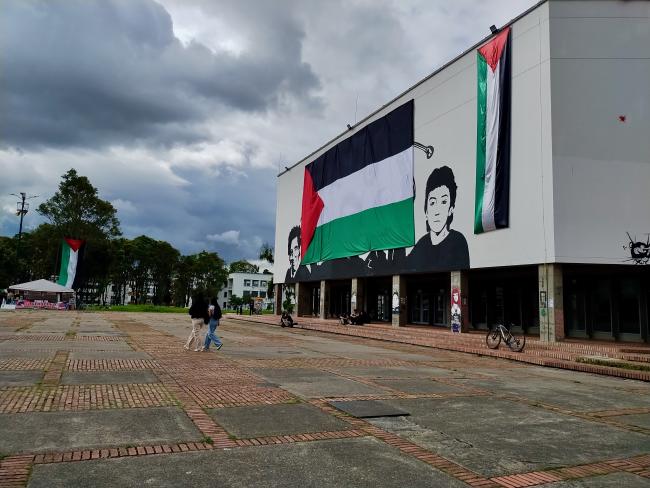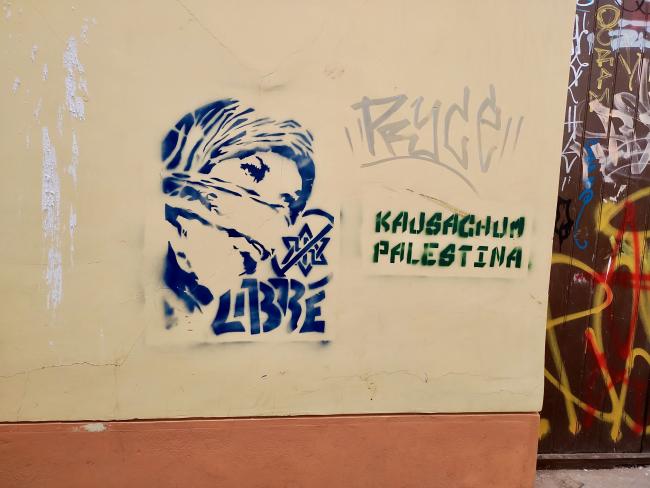
This is the first installment in a multi-part web series on solidarity movements between Latin America and Palestine. View the series here.
Later this year, 50 injured Palestinian children will make the journey to South America to receive treatment at a military hospital in Colombia. Aged 12 to 15, these children have lived their entire lives under a relentless blockade and have survived at least four major Israeli military assaults on Gaza. In Bogotá, throngs of people are expected to receive them as they disembark. Colombia’s medical solidarity comes after President Gustavo Petro announced on June 8 that the country would cease coal exports to Israel. This was not an insignificant act: Colombian coal makes up 60 percent of Israel’s total coal imports, which in turn account for 22 percent of Israel’s power grid output.
Colombia carries on a long history of solidarity with the Palestinian struggle in Latin America. Weaving together both state-level and popular support for Palestinian liberation allows us to see how communities in struggle can establish a basis of global politics beyond power and domination.
Latin American state-level support for the Palestinian struggle extends as far back as the early 20th century, when the Palestinian question first became a flashpoint for the international anti-imperialist movement. This south-south solidarity became institutionalized with the 1927 formation of the League Against Imperialism, which included numerous Latin American countries. Later, the Palestinian question illuminated the schism between “actual existing socialism” and the Third World during the 1947 vote on United Nations Resolution 181, or what became known as the partition vote. The Soviet Union voted in favor of Israel’s formation while Cuba joined blocks from South Asia and the Middle East in voting against the resolution. Cuba was the sole Latin American country at that time to vote against the partition of Palestine.
By the 1960s, the most prominent form of international solidarity with Palestine was framed through the struggle for an independent decolonized Palestinian state as part of the broader Third World Liberation campaign. In January 1966, fresh off its revolution, Cuba welcomed over 500 participants from over 82 countries, including representatives of the Palestinian Liberation Organization (PLO), to the first Tricontinental Conference, held in Havana. Solidarity with Palestinians became a central issue and focus for the Organization of Solidarity with the People of Asia, Africa and Latin America (OPSAAAL), an anti-imperialist movement founded at the conference. Along with Nicaragua, Cuba went on to recognize full diplomatic status for the PLO. In 1973, at the fourth conference of the non-aligned movement, Cuba ceased to recognize Israel’s sovereignty. Two years later, Cuba sponsored UN Resolution 3379, which equated Zionism with racism.

In the late 20th century, neoliberal globalization drove wedges within the internationalist movement, subsuming Third Worldism within the rise of global multiculturalism. This era culminated with the signing of the Oslo Accords in the 1990s, which carved out Palestinian territory. These changes shifted the paradigm of struggle from anti-colonialism to one centered around recognition and human rights. However, the confluence of environmentalist movements and anti-corporatism at the turn of the 21st century led to the formation of an alter-globalization movement that reignited critical solidarity with Palestine.
One of the most influential institutions to come out of this period was the World Social Forum, established in 2001 to bring together social movements from around the world. In 2002, the World Social Forum even held a Palestine-specific forum in Ramallah titled “Negotiated Solutions for Conflicts.” Former president of Venezuela Hugo Chávez often publicly declared his support for the Palestinian struggle at a number of these forums.
Grassroot or Popular Solidarity
Beyond the state level, across the continent, the deepest forms of solidarity have been expressed most intimately among the pueblos of Latin America. This grassroots solidarity is fueled by a deep connection to shared histories of violence as well as an understanding of how centralized power and colonial violence extend globally across imagined borders. Beyond the internationalism that brought hundreds, if not thousands, of Latin American cadres to red cells, including the Popular Front for the Liberation of Palestine, in the 1960s and 70s, the most sustainable dimension of Palestinian solidarity as it pertains to Latin America has been a critical analysis among movements of how everyday forms of violence connect to structures and systems of domination.
Palestine has long been viewed as a critical site where acute forms of dispossession and colonial violence take place. At the turn of the 21st century, the Zapatistas became one of the first groups to prominently address the struggle of Palestinians. Viewing the violence perpetrated by the Zionist state as a part of the global assemblages of power, the Zapatistas have studied how the Mexican state serves as a key node in this process, not least because of its reliance on Israeli weapons.
Prior to October 7, 2023, the Zapatistas had called Israeli military incursions in the occupied territories textbook examples of conquest. It was this framing of the dispossession of Palestinians in relation to their own historical context that was a theme during the 2014 escuelita in Mexico for a course on “Freedom According to the Zapatistas.” One of the communiques put out by students of the escuelita, “The Nakba in Chiapas,” placed the Palestinian reality within the broader struggle of colonization and the fight for another world: “The world that began on October 12, 1492 was the one that made May 15, 1948 [the Nakba] possible, and it has been a catastrophe for humanity. This is a world that requires the annihilation of those of us who refuse to live by their design, and the only way we can win this struggle, as the Zapatistas have taught us, is by creating a new world together. A renewed world, as is often stated, ‘a world where many worlds fit.’”

It is not just organized movements that have made these connections but also pueblos, who form a natural affinity with Palestinians due to their own daily violent realities. In Brazil’s underdeveloped periphery, the long history of racialized policing and criminalization has led urban residents to compare their reality with that of Palestine. In Morro da Providência, a neighborhood of Rio de Janeiro, state violence in the form of structural neglect and socio-economic marginalization has led residents to refer to it as Gaza for years. Adriana Odara Martins, a resident of Morro da Providência, member of the feminist group Articulation of Brazilian Women, and a coordinator for the Unified Black Movement, says: “We are here in solidarity [with Palestine] because we have empathy. We know what it is like to live under violence.”
Few other communities understand historical erasure, cultural loss, and territorial dispossession like the Indigenous communities or pueblos originarios of the Americas. In the Southern Cone, the colonization of Wallmapu, the ancestral land of the Mapuche in what today is Argentina and Chile, remains in the community’s collective memory. As the Mapuche leader or weychafe Moira Millán wrote in a widely circulated open letter a couple of months after the start of the latest Israel genocide: “Every bullet that kills the lives of my Palestinian sisters and brothers pierces my body. I relive the genocide with every bomb that falls on Gaza, with every child killed.” Beyond analogy, the deep empathy for the Palestinian struggle stems from a project of building transnational networks of support. Evidence of this can be seen in the presence of various flags and symbols of Indigenous resistance present at demonstrations and rallies in support of Palestine.
While state-level support for Palestine has reflected the political epoch and the governing regime in power at the time, support among the popular bases has remained consistent throughout history. Grassroots peoples, communities, and movements find in their own experiences a comparable reality to the forms of hyper-criminalization, dispossession, and cultural erasure seen in Palestine. While capitalist modernity touches down and impacts different places to varying degrees, this process ultimately upholds a global regime predicated on extraction and dispossession.
To invoke the Palestinian struggle is to reject this social order and to take a stand in defiance of capitalist modernity, which is why criticism of the genocide has been so vehemently repressed in the Global North. In Latin America, Palestine not only represents the struggle of a people refusing to submit to a colonial order, dispossession, and subjugation, but also evokes the spirit of perseverance, resistance, and the desire to live a dignified life. The intimacy between pueblos in Latin America and Palestine is a testament to a global undercurrent that seeks the preservation of life with dignity, bringing communities together under shared aspirations to create new worlds.
In the midst of the censorship and intimidation of pro-Palestine voices in the first weeks and months of Israel’s latest assault on Gaza in late 2023, a collective of students from various universities across North America came together to discuss the legacies of solidarity actions between Abya Yala/Latin America and Palestine. After hosting a zoom conversation with over 300 attendees from around the globe, we decided to bring together a collection of writings and reflections on the intimate connections between Abya Yala and Palestine. This essay introduces that series. With contributions from activists, journalists, academics and others, this series offers both past and new in-depth analysis on the intersections between Abya Yala and Palestine. We hope this series will serve as an informational space that strengthens the historical connections between these regions and deepens solidarity among pueblos in resistance. This project will continue in the pages of the Winter 2024 NACLA Report, which will be dedicated to Abya Yala and Palestine.
George Ygarza is a translator, popular educator, and postdoctoral researcher at Binghamton University. He is also a member of Faculty for Justice in Palestine.
Editor's note: A correction was made on September 27, 2024 to more accurately reflect the details of the 2014 escuelita in Chiapas.

